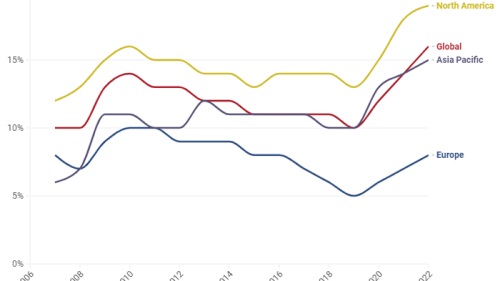Former New York Governor Eliot Spitzeropened the ULI WashingtonReal Estate Trends conference on April 17 by defending the Dodd–Frank Wall Street Reform and Consumer Protection Act(Dodd-Frank). Spitzer, a Democrat, criticized Republican presidential candidate Mitt Romneyfor characterizing Dodd-Frank as “an encroachment on freedom” and for calling for its repeal.
How will Dodd-Frank impact U.S. real estate markets? Not much, according to Spitzer, because it is being “whittled away piece by piece.” Spitzer told the ULI audience, “TBTF (‘ too big to fail') is worse than ever, banks are bigger and more concentrated than ever, and the incentive for bad investing is greater than ever. Will we have a crisis again? Yes.”
Spitzer hearkened back to his years as New York’s Attorney General (1998-2006) for examples of why the government needs to regulate private industry. Investment bankers readily admitted that they were deceiving investors, using the excuse that “everyone was doing it.” Midwestern power companies, which had cleaned their own states’ air by building thousand-foot-high smokestacks, were creating air and water pollution more than a thousand miles away in New York. Pharmaceutical companies would not voluntarily disclose the side effects of popular drugs. “All these cases and others proved that industry self-regulation does not work,” Spitzer stated. “The only entity that can enforce fair play is government.”
As for the financial crisis of 2008, he continued, “we should have seen it coming. In the A.G.’s office, we brought subprime cases against banks as far back as 1999, and the banks refused to provide information. By the time we won in the state Supreme Court in 2008, the damage had been done. When the music is playing, everyone will continue to dance, and no one wants to stop putting quarters in the jukebox. Regulators said they did not have the power to stop it, but they did – they just did not want to use it.”
Within the framework of the 2012 presidential election, Spitzer noted, there is an ongoing debate about the role of government. “From Roosevelt to Reagan, the country went one way; since Reagan, we have gone the other way, and now we are at a fork in the road,” he commented. “I think both Dodd-Frank and the President’s health care legislation fall squarely within the existing understanding of the Constitution, but five Supreme Court justices could essentially rewrite the Constitution.”
Spitzer then moved away from discussing regulation to analyzing the economy in general. After World War II, he explained, the United States was the only country that had enough capital, labor, and stability to create long-term economic growth in a free-market framework. This advantage lasted for over 30 years, but now other nations have adopted the American model and are surging ahead. Globalization is helping to bifurcate the U.S. economy, now dominated by low-level service jobs that cannot be outsourced and high-level “new economy” professional jobs—along with stagnating or falling real wages and a diminishing middle class.
So what does this mean for real estate markets? “There are a limited number of cities worldwide that act as magnets for intellectual capital, because that is what is now driving the economy,” he said. “Austin is that kind of city. Will Washington continue to have appeal for college graduates?”
“The economic sectors driving the economy used to be known as ‘FIRE’: finance, insurance, and real estate,” Spitzer concluded. “But now it’s ‘ICE’: intellectual, cultural, and educational. In the competition between FIRE and ICE, ICE is winning.”





